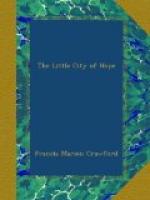He had no money for the casting, but even before trying to raise the cash it was necessary to make the wooden model. He could do that, and he set to work to sketch the drawing within five minutes after the idea had once flashed upon him. As his eye followed the lines made by his pencil, he became more and more convinced that he was right. When the rough sketch was done he looked up at the engine. Its familiar features seemed to be drawn into a diabolical grimace of contempt at his stupidity, and it looked as if it were conscious and wanted to throw the wrongly-made piece at his head. But he was overwrought just then and could have fancied any folly.
He rose, shook himself, and then took a long pull at a black bottle that always stood on a shelf. When a man puts a black bottle to his lips, tips it up, and takes down several good pulls almost without drawing breath, most people suppose that he is a person of vicious habits. In Overholt’s case most people would have been wrong. The black bottle contained cold tea; it was strong, but it was only tea, and that is the finest drink in the world for an inventor or an author to work on. When I say an author I mean a poor writer of prose, for I have always been told that all poets are either mad, or bad, or both. Many of them must be bad, or they could not write such atrocious poems; but madness is different; perhaps they read their own verses.
When Overholt had swallowed his cold tea, he got out his drawing materials, stretched a fresh sheet of thick draughtsman’s paper on the board, and sat down between the motor that would not move and the little city in which Hope had taken lodgings for a while, and he went to work with ruler, scale and dividers, and the hard wood template for drawing the curves he had constructed for the tangent-balance by a very abstruse mathematical calculation. That was right, at all events, only, as it was to be reversed, he laid it on the paper with the under-side up.
He worked nearly all night to finish the drawing, slept two hours in a battered Shaker rocking-chair by the fire, woke in broad daylight, drank more cold tea, and went at once to his lathe, for the new piece was in the nature of a cylinder, and a good deal of the work could be done by turning.
The chisel and the lathe seemed to be talking to each other over the block of wood, and what they said rang like a tune in John Henry’s head.
“Bricks without straw, bricks without straw, bricks without straw,” repeated the lathe regularly, at each revolution, and when it said “bricks” the treadle was up, and when it said “straw” the treadle was down, for of course it was only a foot lathe, though a good one. “Sh—sh—sh—ever so much better than no bricks at all—sh—sh—sh,” answered the sharp chisel as it pressed and bit the wood, and made a little irregular clattering when it was drawn away, and then came forward against the block again with a long hushing sound; and Overholt was inclined to accept its opinion, and worked on as if an obliging brassfounder were waiting outside to take the model away at once and cast it for nothing, or at least on credit.




